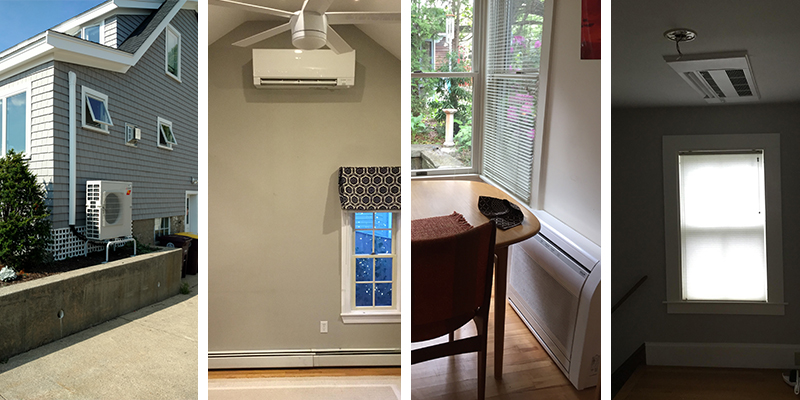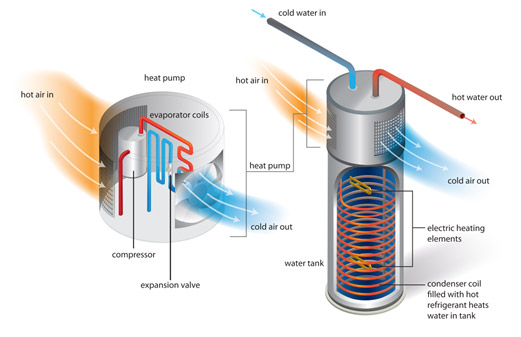Learn more about clean heating and cooling technology.
Click on the images below (or scroll down) to learn more about the four clean heating and cooling options HeatSmart Newton is offering.


About Air Source Heat Pumps
How do air source heat pumps work?
Air source heat pumps (ASHP) are electric appliances that provide heating and cooling by moving heat into a building (for heating) or out of a building (for cooling).
Heat pumps do not create heat through burning fossil fuels like conventional heating systems. Instead, heat pumps transfer heat from one place to another by using a refrigerant that absorbs heat from the air and moves it in or out of a building. This is similar to the way that a refrigerator or air conditioner works—except that it can move heat in either direction to provide both heating and cooling.
Since it takes far less energy to move heat than it does to create heat, air source heat pumps are much more efficient: while a fossil fuel heating system is 80-90% efficient (wasting 10-20% of every dollar you spend on oil, gas, or propane), an air source heat pump can be 200-400% efficient, providing 2-4 units of heat for every unit of electricity you pay for.
Air source heat pumps are considered to be clean heating and cooling technologies because the source of heat used for your home comes from the outdoor air as opposed to burning fossil fuels. The electricity that powers a heat pump can also come from renewable sources—like rooftop solar or the 100% renewable option offered through Newton Power Choice. Even if a heat pump is powered by electricity from the grid, it will reduce greenhouse gas emissions from fossil fuels by 20-60% while improving indoor air quality and improving the comfort of your home or business.
ASHPs are installed as either supplemental systems (displacing some but not all of the heating or cooling from the existing heating or cooling system for select areas in your home) or as primary systems completely replacing the existing system (or keeping the existing system in place but only for backup). Special controls are available to coordinate with your existing system—and installing these controls can give you access to thousands of dollars of extra rebates from Mass Save if you heat with oil or propane!
Types of Air Source Heat Pumps
There are two types of ASHP systems commonly installed in homes in Massachusetts:
Ductless air source heat pumps can provide heating and air conditioning without the need for central ductwork. Each ductless system includes one outdoor unit connected to one (single-zone) or more (multi-zone) indoor wall, floor or ceiling air distribution units. Ductless ASHPs are often referred to as ductless mini-splits.

From left to right: (1) a ductless outdoor unit, (2) a standard wall-mounted indoor unit, (3) a floor-mounted indoor unit, and (4) a ceiling cassette indoor unit.
Ductless air source heat pumps are the most efficient air-source systems and can be installed as a primary source of heating and cooling or installed to supplement existing systems. These supplemental applications could include, for example:
- Installing indoor units in the most frequently used larger rooms like family rooms or master bedrooms to displace heating or cooling from your existing system
- Installing indoor units in new additions as the sole/primary source of heating or cooling
- Placing indoor units in hot or cold spots of your home that can’t seem to be fixed with better insulation or more invasive modifications to your home
Ductless indoor units come with remote or wireless controls (or smartphone apps!) that give you control over each unit and allow you to use them for heating, cooling, dehumidification or as a fan. Because each indoor unit can be controlled individually (forming independent heating/cooling “zones”), you can heat or cool different zones in your home to different temperatures depending on personal comfort preferences—or reduce your energy use even more by turning down the unit in zones that are not being used.
Ducted air source heat pumps have an outdoor unit that is connected to an air handler (similar to a furnace or central air conditioner) in a building’s ductwork, which is used to heat or cool the building. Ducted (also known as “central” or “unitary”) ASHPs are not much different from central air conditioners, except that they provide heating and cooling in a single system. Ducted ASHPs can work with your home’s existing ductwork, though some modifications may be necessary to adapt it from being suited for a furnace or central AC to being suited for a heat pump.
ASHPs are installed as either supplemental systems (displacing some but not all of the heating or cooling from the existing system for select areas in your home and linked to your existing system with special controls), or as primary systems which completely replace the existing system (or keep the existing system in place but only for backup).
| Link | Description |
|---|---|
| Air Source Heat Pump Webinar | Our kickoff webinar discussing the application of heat pumps for residential heating, cooling and hot water from April 27th. (RT 1hr 20min) |
| Air Source Heat Pump Factsheet | The Air Source Heat Pump 101 factsheet discussing the application and benefits of mini-split heat pumps for residential heating and cooling. |
| New Construction & Renovation Factsheet | Details on the benefits and of installing air source heat and avoiding natural gas in newly constructed buildings, building additions or renovations. |
About Heat Pump Water Heaters
How do heat pump water heaters work?
Heat pump water heaters also use heat pump technology to transfer heat from one place to another. Unlike heat pumps, which are used to heat and cool the air in your home, heat pump water heaters extract heat from the air and moves it into a tank to heat water. As a result, heat pump water heaters are often over 3 times more efficient than electric resistance water heaters.
As shown in the diagram below, most heat pump water heaters differ from air source heat pumps in that all of the heat pump elements are indoors and combined within the storage tank. Most heat pump water heaters are “hybrid” heat pump water heaters and also include conventional electric resistance heating elements to provide backup heating when hot water demand is high.

What are the key benefits of heat pump water heaters?
The primary benefits of using heat pump water heaters are energy savings, reduction of greenhouse gas emissions, and dehumidification.
Energy savings. If you use an electric resistance tank to heat your water, a heat pump water heater will cut your water heating bill by more than 50%. You can also save on your water heating bill if you use an oil or propane water heater. Depending on your hot water usage, this could amount to over $300 in energy savings a year!
For example, replacing a conventional 50-gallon electric water heater with a 50-gallon HPWH can reduce daily power consumption from around 8 kWh to around 4 kWh. This can save upwards of 1,460 kWh over the course of the year or over $320 – not including the savings from no longer having to run a dehumidifier. During the winter, the cooler dry air from the heat pump water heater is directed to the area around the heat pump or to the outside through ducting.
Reduction of greenhouse gas emissions. Because they operate very efficiently, heat pump water heaters reduce the amount of electricity consumed for water heating, reducing the emissions from power generation. If you are using electricity that is provided from renewable sources, you further minimize the emissions produced to power your water heater.
Dehumidification. Humidity can be a problem in many basements in Massachusetts. A heat pump water heater will dehumidify whatever space it’s in, greatly reducing the need to run a dehumidifier in your basement
Who should use a heat pump water heater?
Homes with an electric resistance, oil, or propane water heater. A heat pump water heater could be an excellent investment for you if you currently are using a non-gas water heater. The savings from going from an electric resistance tank to a heat pump water heater and available rebates will offset the added upfront cost and pay back your investment over the course of several years.
Homes with a partially finished or unfinished basement with enough clearance. Heat pump water heaters are a bit taller than most traditional hot water heaters and need sufficient airflow to operate. Additionally, they should ideally be placed in an unconditioned space (like a basement that doesn’t have heating) to minimize the use of heat provided by your heating system to heat the water tank. If you have enough space next to your furnace or boiler in an unconditioned space, a heat pump water heater will be able to take advantage of the waste heat generated by your furnace.
| Link | Description |
|---|---|
| Heat Pump Water Heater Factsheet | The Heat Pump Water Heater 101 factsheet discussing the application and benefits of heat pump water heaters in residential buildings. |
| Heat Pump Water Heater Video | Learn more about heat pumps water heaters and the install experience from one of your Newton neighbors. |
